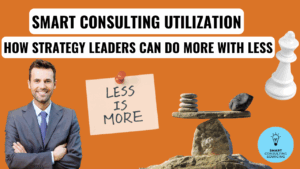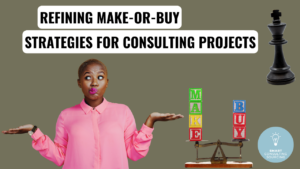Hello and welcome back to Smart Consulting Sourcing, the only podcast about consulting procurement.
I am Hélène, and today we will discuss how consulting buyers can stay ahead in a market booming for consultants.
However, before that, let me give a recap of last week’s episode.
Despite all the bad press about consultants and their fees, discussions should primarily be about impact and value. This does not prevent us from having a closer look at the structure of the fees and to make sure you are using the right compensation model when working with consultants.
Depending on the sort of consulting work being done and the location of the consulting business, consulting costs can vary greatly.
When a consulting firm sets its rates, it must take into account both the expenses of doing business and the desired profit margin. The total of these two figures is then divided by the number of billable days in a year to arrive at the daily rate.
This daily rate is then used to calculate the fee for each project. The consulting firm must also set aside a portion of its fees for employee bonuses and reinvestment. This portion is typically a percentage of the total fees earned.
In recent years, we’ve seen consulting fees increase for many firms, as demand for consulting services has outpaced supply. This has led to a competitive market for consulting talent, and firms are increasingly willing to pay top dollar for the best consultants.
However, not all consulting firms are created equal. Some still operate on a lower-cost model, offering competitive rates that can be appealing to budget-conscious clients. As the consulting market continues to evolve, we can expect to see changes in consulting fees charged by different firms.
Listen to the complete podcast about Consulting fees: a state of the market
However, this week, I want to discuss “how consulting buyers can stay ahead in a market booming for consultants”
As a consulting buyer, it’s important to understand the market and stay ahead of trends. After all, it’s your job to help your organization make the best decisions about consulting purchase.
Keep in mind that the market is constantly changing, so it’s important to stay up-to-date on new developments. In addition, consulting buyers should have a good understanding of the competitive landscape.
This way, you can advise your internal clients on how to stay ahead of their competitors. By staying informed and offering strategic guidance, you’ll be able to add value for your clients and grow your business.
The consulting market is booming, and that’s good news for consultants.
There are lots of benefits to being a consultant in a tight market
The first being, higher margins. Indeed since the market is tight, clients will not negotiate as much as usual because they will not have many alternatives. This points to the bargaining power of consultants!
They don’t need to spend much time on commercial activity. Partners are usually spending at least 30% of the time in prospecting, but they don’t need to if the clients come to them. And since clients negotiate less, they can keep the margin (instead of spending it on commercial time). As a result they tend to dwell in to more delivery work overall
However, there are also some downsides to this boom.
The talent market is tense. The market is growing and consulting firms are hiring. There is already a war on talents and this is not getting any better.
Delivery can be difficult. The consulting firms have so much work piled up that they overbook their, consultants and they can’t always meet their deadlines. And it impacts the delivery of the projects they are working on . And as a result, the impact that was supposed to come out of the project might be lower than expected. And clients can become frustrated with delays or less productive projects.
On top of that, The consulting firm might be anxious. They are facing with a dilemma : Should they hire new consultants or not? Is the growth sustainable? Because when they hire someone, they need to feed them with projects even after the tide is gone. Because they can only remain profitable if their consultants are fully booked, all year long..
Finally, if they decide not to hire new consultants, they will need to work with sub-contractors, often independent consultants. The problem is that consulting firms may not always be clear on what they are getting when they hire a subcontractor. The quality of the work may not meet their expectations, or the sub contractor may not be able to complete the project on time.
In addition, because sub contractors are usually not employees of the firm, consulting firms may have difficulty holding them accountable if something goes wrong.
Ultimately, they need to weigh the risks and rewards of working with subcontractors before making a decision.
What does this mean for clients?
Clients for consulting services are often inclined to work with consultants they are familiar with. But what happens when the usual suspects aren’t available? When the go-to consultants are busy or booked up, they are forced to look elsewhere for their consulting fix.
The problem here is that they don’t know what is the sweet spot on these new consultants, and they can’t believe all the claims they make. They need to understand what is the portfolio of projects they excel at before hiring them.
They need to know the depth and the scope of the consultants expertise, what industries they serve, what projects they have done in the past and what impact they delivered. All of this can be obtained by talking to former clients. Indeed Clients should proceed with caution when engaging with unfamiliar consultants, and should make sure to do their homework before signing on the dotted line.
The thing is that Consulting buyers tend to give into the pressure of getting a team of consultants for their internal clients’ project on time and might decide to work with whatever consulting firm they might think is the closest to the proposal.
And the internal clients might not be happy with the alternatives they are offered, and it could impact their relationships with the consulting buyers.
And when I discuss with consulting buyers, that’s their #1 problem : they have a hard time building the trust with their internal clients.
Another problem is that it can be difficult to negotiate prices with people pushing to start the project yesterday. As a consulting buyer, you want to ensure that you’re getting the best value for your money. But at the same time, you don’t want to delay the project or put it at risk by haggling over price.
The clients could be insisting on using a certain consulting company they are accustomed to and not wanting to consider other options. And it can be that they don’t give a damn about their budget envelope or their savings.
What happens if you don’t hire consultants with the right knowledge and experience? Because you might think that all consulting firms are the same. You might think they are commodities. Well, sorry to burst your bubble, but ‘they are not.
Even if two consulting firms look the same on paper, you will find significant differences on the work they deliver. And these differences could be enough to make your project a success or not.
And I am not even talking about the quality of the outcome, just the approach and the methodologies. So don’t take shortcuts, even if you are pushed to consider only one provider, that is close enough.
Because the risks you are taking are delays in the project completion , subpar work, and even legal troubles.
Another problem when you work with consulting that are extremely busy is that you don’t get to interact with the partners at all. I mean after you have signed the contract to start the project. And the thing is that often the most expert and experienced consultant is the partner…
And finally there is always a risk of being the small client. It is a little bit like airlines if you want:
Airlines tend to overbook to
maximize profits on the premise that some customers won’t make it to their flights owing to circumstances. The seats will be sold to several clients to make sure they are always occupied..
It is an authorized procedure, but it generates dissatisfaction and frustration for the clients.
There is another technique used by airlines that’s called Yield Management: it means that the price is adapted based on demand.
So, yield management works best when demand exceeds supply. It allows airline companies to pick the demand they want to meet in order to increase profits.
So you see that when you are the small client, you might end up with
consultants that are less available, of a lower quality, not particular about schedules and command higher price.
So what can consulting buyers do to stay ahead in this rapidly changing landscape?
Here are some tips:
- Be clear about your needs and objectives. This will help you find the right consultant for your project.
- You need to anticipate and provide visibility to evacuate the time factor. What I mean to say is that, in order to keep their staff occupied over the long term, consulting companies must build a pipeline of projects and clients. Therefore, let’s suppose you offer visibility or volumes over the long term, say for 2-3 years, then the consulting firm will always exchange discounts for visibility.
- Make sure you understand the consulting market. Keep tabs on rates, availability, and trends so you can make informed decisions.
- The market is tense but not everywhere and not all the time. Consulting buyers need to be prepared to find the right alternative for their needs. Because even if your usual consulting firms are busy working on other projects, it doesn’t mean that all the consulting firs in the world with the same capabilities and industry experience are busy. And it doesn’t mean that they are not good consultants.
- Don’t be afraid to ask for references. A reputable consultant should be able to provide you with references from past clients. And this is how you can avoid working with the low-performers. And it is also a good way to make sure they have the right skills and experience for your project.
Be prepared to pay a premium. In a booming consulting market, rates will be higher than usual. However, this doesn’t mean you should overpay for services. That’s why it is so important to find solid alternatives because you will increase your bargaining power and be in a better position to negotiate.
Now, as a client, you want to be the large fish in the tiny pond. This means you need to be aware of your position in terms of relevance and priority for the consulting firms you are working with as well as their client portfolio.
In other words, you should always make sure you are a high-priority client for your suppliers. To get the A-teams, get the best discounts, get priority on all projects.
Finally, we know that consulting is seasonal. It means that they are periods in the year when consultants have less work, and will charge less (Again profitability in consulting is the ability to bill your consultants as much as possible. And you want to avoid idle time, so consulting firms will offer huge discounts to book their consultants in off-peak season).
So, if you can postpone your project, and wait for a better time in the year, you will probably pay less for the same work.
By following these tips, consulting buyers can stay ahead of the curve in a rapidly changing market.
In Conclusion,
The consulting market is booming. It is good news! it means that more companies understand the value they can get by working with consultants.
For consultants, this is a period of abundance: more projects, more clients, more revenues. But it comes with some serious downsides for clients.
For instance, your internal clients are compelled to search elsewhere for their dose when their preferred consultants are overworked or booked up.
And does it mean for consulting buyers? More work. Because your incumbents might be busier, less available, more expensive than usual, you will need to go out of your way to find solid alternatives for your internal clients.
It’s time to stop focusing on what you’re up against and start thinking bigger. The consulting market is booming, but don’t let the pressure make your eyesight go blurry!
There are opportunities out there. All consulting firms is the world are not 100% booked. So if you do your homework, in an organized and thorough way, you will get through this. And cherry on the cake; you will identify new suppliers, develop new relationships, and be more credible with your internal stakeholders.
Isn’t it wonderful? That when life closes one door in front of you, it opens up two more! You just have to be patient and keep looking!
And that marks the end of our podcast. Next week, I want to talk about Procurement strategy and why is it important in consulting? So, stay tuned.
Till then, stay safe and happy sourcing!
If you have other questions about buying consulting and how to stay ahead of the market, remember you can always contact me directly on LinkedIn or by email because I am always game for a chat!
Bye and see you next week! Au revoir!
See you at the next episode. Till then, stay safe and stay connected with us through our community LinkedIn
and follow our Twitter handle @ConsQuest. Don’t forget to like and subscribe to our channels
Podbean
YouTube
Happy Sourcing!







